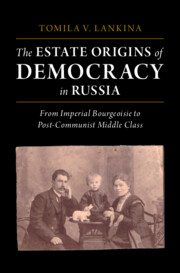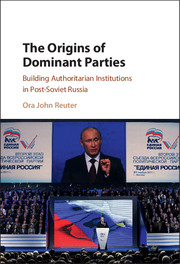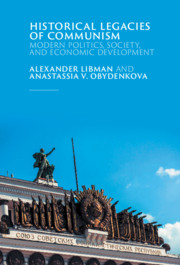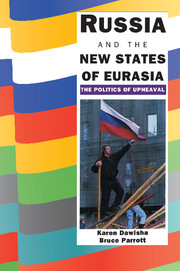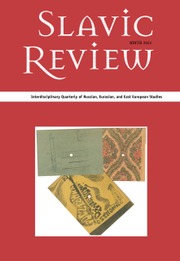The Estate Origins of Democracy in Russia
From Imperial Bourgeoisie to Post-Communist Middle Class
$39.99 ( ) USD
- Author: Tomila V. Lankina, London School of Economics and Political Science
- Date Published: December 2021
- availability: This ISBN is for an eBook version which is distributed on our behalf by a third party.
- format: Adobe eBook Reader
- isbn: 9781009080590
Find out more about Cambridge eBooks
$
39.99 USD
( )
Adobe eBook Reader
Other available formats:
Hardback
Looking for an examination copy?
If you are interested in the title for your course we can consider offering an examination copy. To register your interest please contact [email protected] providing details of the course you are teaching.
-
A devastating challenge to the idea of communism as a 'great leveller', this extraordinarily original, rigorous, and ambitious book debunks Marxism-inspired accounts of its equalitarian consequences. It is the first study systematically to link the genesis of the 'bourgeoisie-cum-middle class' – Imperial, Soviet, and post-communist – to Tzarist estate institutions which distinguished between nobility, clergy, the urban merchants and meshchane, and peasants. It demonstrates how the pre-communist bourgeoisie, particularly the merchant and urban commercial strata but also the high human capital aristocracy and clergy, survived and adapted in Soviet Russia. Under both Tzarism and communism, the estate system engendered an educated, autonomous bourgeoisie and professional class, along with an oppositional public sphere, and persistent social cleavages that continue to plague democratic consensus. This book also shows how the middle class, conventionally bracketed under one generic umbrella, is often two-pronged in nature – one originating among the educated estates of feudal orders, and the other fabricated as part of state-induced modernization.
Read more- Challenges long-held views about the 'great leveller' consequences of the Bolshevik Revolution, promoting a paradigmatic shift in our understanding of communism
- Brings in the overlooked institution of feudal estates to explain how some social groups had been at an advantageous position to advance into the middle class when countries industrialised or modernised
- Includes analysis of vast new archival, census, electoral, occupational, demographic data, as well as genealogies and memoirs
Awards
- Winner, 2023 Davis Center Book Prize in Political and Social Studies, Association for Slavic, East European, and Eurasian Studies
Reviews & endorsements
‘Tomila Lankina has written a deeply original and meticulously researched study of historical sociology with profound implications for how we understand politics in today's Russia. The Estate Origins of Democracy in Russia challenges the widespread scholarly consensus that communism fundamentally altered Russia's social structure. Instead, Lankina demonstrates important continuities – most significantly, the persistence of the Russian pre-revolutionary middle class through decades of communist rule, and its reemergence in its aftermath.' Jeffrey Kopstein, Professor of Political Science, University of California, Irvine
See more reviews‘Tomila Lankina conducts a unique in-depth study of roots and mechanisms of societal resilience and reproduction in Russia for over a century of major transformations. She masterfully combines the use of statistical datasets, extended case studies, macro-sociological interpretations, and micro-historical narratives and offers a novel interdisciplinary framework for a comparative analysis of long-run societal dynamics and its political implications. This book successfully brings society back into our understanding of political developments in Russia and beyond.' Vladimir Gelman, Professor, European University at St. Petersburg, and University of Helsinki
‘Elegantly crafted, beautifully written, richly illustrated, and rigorously evidenced, this book provides an axial twist to Soviet and Russian history and an exemplary, landmark study of the resilience and reproduction of social structures, social identities, and social distinctions, and their significance for politics. Lankina's masterpiece is Tolstoyan in its epic breadth of coverage, evocative powers, and intimate unpacking of the lives and times of Russia's meshchanstvo.' John Sidel, Sir Patrick Gillam Chair in International and Comparative Politics, London School of Economics and Political Science
‘This fascinating book challenges our view of the Soviet period as a rupture in Russia's historical development. The author shows that social hierarchies from the late imperial period thrived under communism and also continue to influence human capital, values, and democratic processes in Russia today. In addition to rigorous statistical evidence, she weaves in anecdotes and interviews that make her arguments more vivid and compelling. Anyone interested in historical legacies, social inequality, and democratic development needs to read this meticulously executed book.' Volha Charnysh, Assistant Professor of Political Science, Massachusetts Institute of Technology
‘The Estate Origins of Democracy in Russia is an exemplar of the new historical political economy. No dilettante, Tomila Lankina does the work of both historian and social scientist in this magisterial work. This is a model for interdisciplinary scholarship.' Scott Gehlbach, Professor, Department of Political Science and Harris School of Public Policy, University of Chicago
‘In this brilliant, erudite, and broad-ranging work, Lankina provides a novel ‘genealogical' perspective on Russian politics, demonstrating how the Russian Empire's urban middle class continues to influence patterns of political and economic development. In so doing, she questions established understandings of the communist experience and reveals the critical role played by families in the reproduction of forms of social stratification over the long run.' Mark R. Beissinger, Henry W. Putnam Professor of Politics, Princeton University
'A richly textured study of historical continuities in the face of revolutionary change. Lankina’s meticulous account of the pre-communist origins of Russia’s post-communist society sheds new light on the logics of persistence and resilience in Russian social structure that shape political possibilities in the present day. Estate Origins is a rewarding read for anyone interested in the social requisites of democracy.' Bryn Rosenfeld, Assistant Professor, Department of Government, Cornell University
‘The Estate Origins of Democracy in Russia is the most inspiring book in Russian studies I have read in the course of the past 10 years or more … There is a wealth of information in the text, and one is often carried away by conjectures or ideas concerning Russian development popping up while reading. ’ Simo Mannila, Eurasian Geography and Economic
Customer reviews
Not yet reviewed
Be the first to review
Review was not posted due to profanity
×Product details
- Date Published: December 2021
- format: Adobe eBook Reader
- isbn: 9781009080590
- contains: 37 b/w illus. 1 map 26 tables
- availability: This ISBN is for an eBook version which is distributed on our behalf by a third party.
Table of Contents
1. Theorizing post-revolutionary social resilience
2. From imperial estates to estatist society
3. Mapping society and the public sphere in imperial Russia
4. The professions in the making of estatist society
5. Education, socialization, and social structure
6. Market values and the economy of survival
7. Family matters: looking back – and forward – in time
8. Society in space
9. The two-pronged middle class: implications for democracy across time and in space
10. The bourgeoisie in communist states: Comparative insights charting a comparative foreword
Afterword
Supplementary appendices: A. Archival sources
B. The 1897 census
C. District matching
D. Interview questionnaire
E. Illustrative Genealogies.-
General Resources
Find resources associated with this title
Type Name Unlocked * Format Size Showing of
This title is supported by one or more locked resources. Access to locked resources is granted exclusively by Cambridge University Press to instructors whose faculty status has been verified. To gain access to locked resources, instructors should sign in to or register for a Cambridge user account.
Please use locked resources responsibly and exercise your professional discretion when choosing how you share these materials with your students. Other instructors may wish to use locked resources for assessment purposes and their usefulness is undermined when the source files (for example, solution manuals or test banks) are shared online or via social networks.
Supplementary resources are subject to copyright. Instructors are permitted to view, print or download these resources for use in their teaching, but may not change them or use them for commercial gain.
If you are having problems accessing these resources please contact [email protected].
Sorry, this resource is locked
Please register or sign in to request access. If you are having problems accessing these resources please email [email protected]
Register Sign in» Proceed
You are now leaving the Cambridge University Press website. Your eBook purchase and download will be completed by our partner www.ebooks.com. Please see the permission section of the www.ebooks.com catalogue page for details of the print & copy limits on our eBooks.
Continue ×Are you sure you want to delete your account?
This cannot be undone.
Thank you for your feedback which will help us improve our service.
If you requested a response, we will make sure to get back to you shortly.
×
